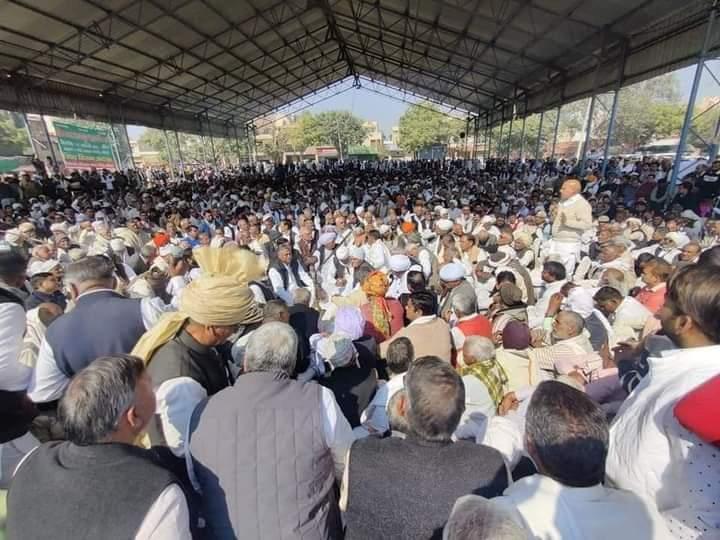Farm Laws Violate Democracy and Federalism

Mahapanchayat at Palwal.
This year, finance minister Nirmala Sitharaman presented the Union budget while thousands of farmers staged their months-long protest at the borders of Delhi. It is a fact that the annual budget is perceived as more of an economic document. Similarly, the farm laws are also being deliberated for their economic rationale.
However, what about the question of democracy and justice inherent to any law? Both the Union Budget and the three new farm laws need to be read as political documents in the context of India’s democracy and its federal structure.
There is something unique about the notions of democracy and justice. They are not merely about institutional rules and regulations or bureaucratic procedures. Instead, people, as well as each participating unit must believe that justice is being done. That is when we can say democracy is being practiced.
So, democracy is also about empowering people, sending a message that they matter, and making participation crucial. In a federal polity, this also applies to all federal units. In the absence of this belief, democracy and federalism are mere abstractions for people.
The farm laws, which are at the epicenter of Indian politics today, violate these basic principles of democracy and justice.
A question is being raised about how fair the demand to repeal these laws, which have been “duly” passed by the Parliament of India, is? Parliament has been given powers to legislate for the people of India. However, has Parliament maintained the sanctity of the legislative process or the principles of federalism established by the makers of the Constitution?
A look at the evolution of Indian institutions and policy thinking on various development matters (especially agriculture) would reveal that in the recent past the Indian polity has digressed from the original vision of the Constitution.
On 8 and 31 August 1949, the Constituent Assembly had discussed agriculture (including income from agriculture) and the regulation and maintenance of uniformity in laws related to standardising the quality of food, and other issues. Agriculture was recognised as a state subject and states were given legislative powers over agriculture and related subjects.
On the other hand, the union government was given powers to prevent monopolies and ensure uniformity in the standards and quality of food and other consumable items. Consequently, agricultural trade, commerce, production, supply, and food distribution were included in the concurrent list by Entry 33(b).
A key objective to give the union government only a few powers was to ensure support from the Centre in achieving equitable distribution of food and to promote research and education in agriculture, without violating the rights of state governments.
Despite this distribution of power, concerns were raised over the union government’s role in promoting the development of the agriculture sector. India faced severe food scarcities during the late 1950s and early 1960s. To balance the union government’s responsibilities and state legislative powers, institutional checks and balances were created in the first two decades after Independence.
The erstwhile Planning Commission and the National Development Council (NDC) were established for this purpose, in 1950 and 1952 respectively. When India began its developmental journey, both these institutions worked as bridges between the union government and the states.
Besides, to make the parliamentary process robust and consultative, the idea of sending laws (especially those with consequences for the states) for discussion to a Standing Committees was followed. The standing committee was expected to bring various legislations to Parliament after consulting various stakeholders, primarily the state governments.
A Food-Grain Enquiry Commission was also set up in 1957 to look into grain shortages and find ways to ensure food security. In 1964, the Agricultural Prices Commission was established to ensure fair prices for farm products, especially foodgrains.
It is possible to question the efficiency of all these mechanisms and how well they achieved their objectives. Yet, these institutional mechanisms provided federal units and other stakeholders a platform to air grievances. The process minimised the possibility of conflict between state governments and the union government. It worked as a shock-absorbing mechanism that helped sustain Indian democracy.
The union government did recognise the limitations of its role in this entire process and hence functioned as a regulatory body or sought to protect the interests of states as well as the farmers.
However, the new farm laws and Parliament’s role in passing these legislations have turned this entire process upside down. First, while passing these laws, Parliament was not seen as an institution where discussion and deliberation should take place at all. The ruling dispensation’s electoral majority was construed as consent from people to ignore the basic principles of deliberation, participation, and “cooperative” federalism.
Second, most institutions meant to protect federalism have already been replaced with a new structure that has them functioning merely as a ‘think tank’ or with no role in federal consultations. Doing away with the erstwhile Planning Commission and replacing it with the Niti Aayog was the first such step. Similarly, the NDC has been pushed to the margins of the debate about what constitutes development.
Worst of all, Parliament did take up a role that was never envisaged by the Constitution-makers: wielding legislative power over the agricultural sector on behalf of state governments. The new farm laws aim to withdraw the state as a regulator in favour of new players in agricultural trade and commerce.
The question is: why? The answer lies in the suggestion made by one of the members of the Niti Aayog, Bibek Debroy. His suggestion to the Aayog, which has been supported by the Chief Economic Advisor to the Government of India, Arvind Subramanian, is to make agricultural income taxable. Then finance minister Arun Jaitley had denied the government intended to do this, but the new farm laws are a route for the union government to enter the farmlands and proceed to impose new tax mechanisms. Once regulated companies replace the small traders functioning in the mandis, this is exactly what will become possible.
Naziruddin Ahmad, a member of the Constituent Assembly, had argued in the 8 August 1949 debate against Parliament having any powers to pass legislation concerning agriculture. He said, “The Government of India Act actually adopted this definition in the Indian Income Tax Act and crystallised it forever... If we now try to vary the meaning of agricultural income, the result would be that agricultural income, which is a provincial matter, and which is a provincial subject, will be seriously encroached upon. Parliament may easily encroach upon the definition and might easily say, ‘agricultural income is an income which does not arise from agriculture.’”
The Expert Committee headed by Dr. Rajendra Prasad, which was examining financial provisions, also decided to continue with a provision in the Government of India Act, 1935, that had left agricultural income to be a state subject.
These questions of federalism and democracy are at the core of the ongoing protests by the farmers. Apart from questioning the laws' economic motives, the protests are also an effort by the farmers to assert their agency as stakeholders in India’s development. The makers of the Constitution understood this desire of Indian citizens. The current ruling dispensation has put the basic tenets of democracy, participation, and justice at stake when it imposes its version of development on citizens.
The author is an assistant professor at the Centre for Political Studies, JNU. The views are personal.
Get the latest reports & analysis with people's perspective on Protests, movements & deep analytical videos, discussions of the current affairs in your Telegram app. Subscribe to NewsClick's Telegram channel & get Real-Time updates on stories, as they get published on our website.
























